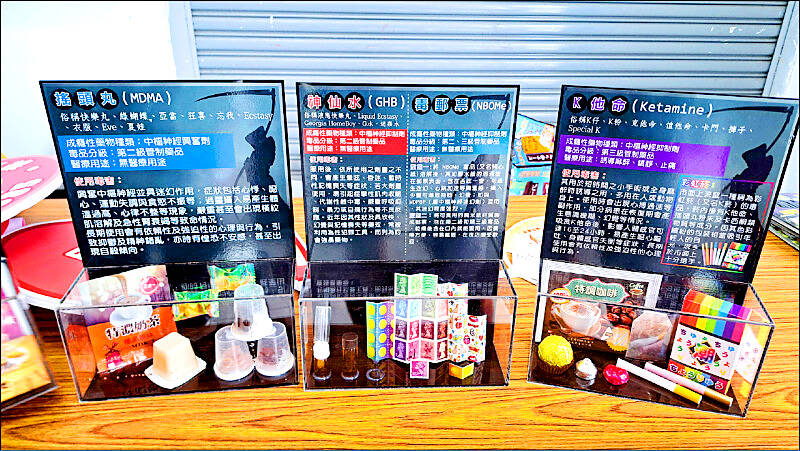There are likely many more unreported, “hidden” cases of illegal narcotic or synthetic drug use in Taiwan, based on the disparity between the number of arrests and autopsy results, a report by medical scientists and the Ministry of the Justice said.
After accessing a national database compiled by law enforcement agencies, the team found that the number of unreported incidents of new synthetic drug use were 174 times more than arrests in such cases.
The team comprised Institute of Forensic Medicine medical scientist Pan Chih-hsin (潘至信), National Cheng Kung University (NCKU) School of Pharmacy professor Edward Lai (賴嘉鎮) and NCKU Department of Psychiatry medical doctor Wei Shyh-yuh (魏士郁).

Photo: Taipei Times
“It was the first time university research teams coordinated with the Ministry of Justice’s forensic institute,” Wei said. “We looked at autopsy reports and police arrest records to arrive at more accurate estimates of unreported, hidden cases of illegal drug use in Taiwan.”
The study examined records from 2013 to 2019, during which coroners had performed autopsies for 1,653 deaths and tested for five main illegal drug substances: heroin, amphetamine, ecstasy, ketamine and new forms of synthetic, psychoactive drugs, he said.
“These were broadly divided into two groups: ‘those with a past arrest record’ and ‘hidden, unreported cases.’ To calculate the ratio, we placed the former as the denominator and the latter — those who had no criminal record, had not undergone a urine test or who did not need to give hair samples — as the numerator,” Wei said.
Lai said that the ideal figure was a 1-1 ratio, but the results showed 0.7 for heroin, 2.2 for amphetamine, 14.8 for ecstasy, 4.9 for ketamine and 174 for new forms of synthetic drugs.
“The 147-1 ratio represents the total number of people who died due to the use of new forms of synthetic drugs, but were never caught nor tested for drugs,” Lai said. “It is a figure that far surpasses the suspected total number of illegal drug users being monitored by the police.”
That indicated that traditional methods are no longer able to keep up with the new trends and novel forms of synthetic drug use, the researchers said.
The drugs were sometimes turned into powders to be mixed into beverages, such as coffee or milk tea, or used as ingredients in food items, such as pudding or candy, they said.
The researchers said that their study could provide important scientific basis for the government to implement new policies to combat the rise in illegal drug use.
Drug overdose resulting in death used to be primarily a result of injecting drugs into the body, but now, overdose could happen by eating, drinking or vaping drugs, they said, adding that drugs could cause traffic accidents that lead to death or injury, or result in getting infectious diseases.
Ministry officials said the study was very helpful and that they would assess the findings with the High Prosecutors’ Office, which is in charge of coordinating judiciary efforts to fight against the use of narcotics, and come up with new plans of action.
Additional reporting by Wang Ting-chuan and Chiu Chun-fu

Taiwanese were praised for their composure after a video filmed by Taiwanese tourists capturing the moment a magnitude 7.5 earthquake struck Japan’s Aomori Prefecture went viral on social media. The video shows a hotel room shaking violently amid Monday’s quake, with objects falling to the ground. Two Taiwanese began filming with their mobile phones, while two others held the sides of a TV to prevent it from falling. When the shaking stopped, the pair calmly took down the TV and laid it flat on a tatami mat, the video shows. The video also captured the group talking about the safety of their companions bathing

US climber Alex Honnold is to attempt to scale Taipei 101 without a rope and harness in a live Netflix special on Jan. 24, the streaming platform announced on Wednesday. Accounting for the time difference, the two-hour broadcast of Honnold’s climb, called Skyscraper Live, is to air on Jan. 23 in the US, Netflix said in a statement. Honnold, 40, was the first person ever to free solo climb the 900m El Capitan rock formation in Yosemite National Park — a feat that was recorded and later made into the 2018 documentary film Free Solo. Netflix previewed Skyscraper Live in October, after videos

Starting on Jan. 1, YouBike riders must have insurance to use the service, and a six-month trial of NT$5 coupons under certain conditions would be implemented to balance bike shortages, a joint statement from transportation departments across Taipei, New Taipei City and Taoyuan announced yesterday. The rental bike system operator said that coupons would be offered to riders to rent bikes from full stations, for riders who take out an electric-assisted bike from a full station, and for riders who return a bike to an empty station. All riders with YouBike accounts are automatically eligible for the program, and each membership account

A classified Pentagon-produced, multiyear assessment — the Overmatch brief — highlighted unreported Chinese capabilities to destroy US military assets and identified US supply chain choke points, painting a disturbing picture of waning US military might, a New York Times editorial published on Monday said. US Secretary of Defense Pete Hegseth’s comments in November last year that “we lose every time” in Pentagon-conducted war games pitting the US against China further highlighted the uncertainty about the US’ capability to intervene in the event of a Chinese invasion of Taiwan. “It shows the Pentagon’s overreliance on expensive, vulnerable weapons as adversaries field cheap, technologically